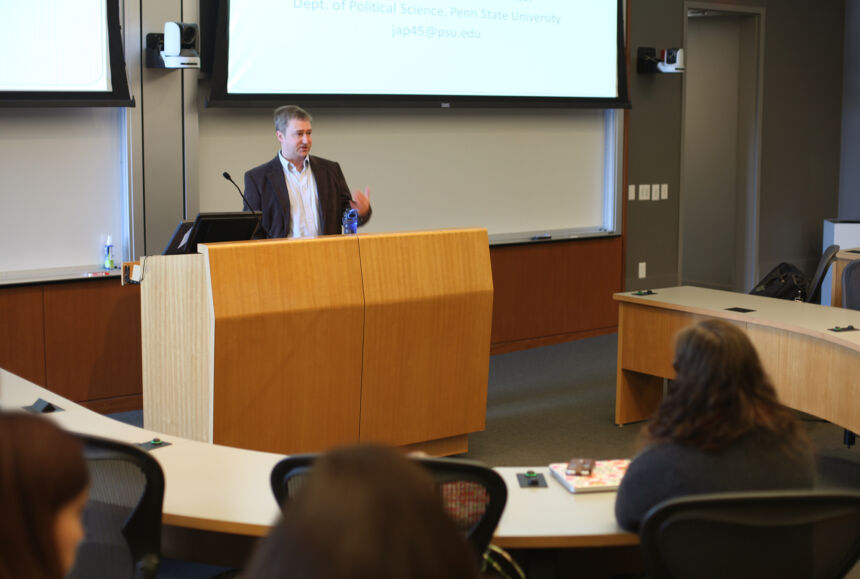February 06, 2015
Penn State terrorism expert speaks to SIA students about the challenges of studying terrorism

James Piazza, associate professor in Penn State's Department of Political Science, spoke about terrorism this week as part of the Penn State School of International Affairs’ spring colloquium: Current Policy Challenges.
Piazza, whose research focuses on terrorism and political violence, focused his presentation on an overview of terrorism, and the challenges of studying such a vague term. He explained that over 100 different definitions of terrorism exist, and the United Nations uses about seven different definitions, but there is no agreed upon legal definition of the term.
“Terrorism is an emotionally and politically charged term,” he said. “Researchers and those who study this topic, we have a workable definition, but it’s inadequate.”
The working definition Piazza and other researchers use describes terrorism as a violent behavior or tactic that has a political objective that is designed to gain attention of a wider audience, conducted by an organization with a chain of command, and perpetrated by a sub-national, non-state entity. This definition gives researchers a baseline to explore the topic and compile statistics and information.
However, Piazza stated this definition still presents challenges with how researchers look to specific root causes in certain areas that make terrorism more likely to occur. These root causes include political features, economic circumstances, social features, and strategic factors. However, Piazza explained these indicators are not precise.
After this overview of general terminology, Piazza examined the characteristics of terrorists. People who commit terrorist acts generally do not have weak economic roots, are more likely to commit attacks in democracies, have strong ethnic grievances, track state failure, and are not crazy. He noted that there is a lack of evidence that terrorists suffer from psychological pathologies.
“Most people think terrorists are crazy as a way of making sense of what they do,” he said. “But psychological testing has not found them to be abnormal, which I find kind of frightening.”
Researchers found certain terrorist personality traits, including that they tend to be followers, have low ego strength, and are socially impressionable and awkward.
“But how many people do you know that are followers, impressionable, and socially awkward?” Piazza asked the students. “These traits fit an enormous number of people, and 99.999 percent of them will never become terrorists.”
Another challenge in researching this topic without a formal definition is the legitimacy of the political claims of a particular group. To use the word “terrorist,” Piazza said, automatically makes the group a “them” versus “us” and their objectives unsanctioned. Piazza reminded the students that some terrorists or groups think of themselves as freedom fighters with noble political objectives.
Piazza, who also directs the Department of Political Science Graduate Program, focuses his research and teaching on international politics, international security, terrorism, and political violence. His published research has examined several themes including the socioeconomic roots of terrorism, minority rights and terrorism, and the impact of political regime type, political stability, religion, human rights, and state repression on terrorist movements and terrorist activity. In his more recent work, he has investigated the impact of the transnational narcotics trade and counternarcotics strategies on terrorist activity. He has also embarked on a new research agenda examining U.S. public opinion about the use of extraordinary interrogation and detention of terror suspects and is a co-investigator with colleagues on a multi-year grant project funded by the U.S. Department of Defense Minerva Research Initiative investigating the role of natural resource wealth on armed intrastate conflict actors globally.
His published research has appeared in a variety of journals including American Journal of Political Science, Journal of Politics, International Studies Quarterly, Comparative Political Studies, the Journal of Conflict Resolution, the Journal of Peace Research, Political Psychology, Public Choice, Political Research Quarterly, Terrorism and Political Violence, Foreign Policy Analysis, and the Southern Economic Journal.
School of International Affairs professor and U.S. Ambassador (Ret.) Dennis Jett, organizes the semester-long colloquium as part of his course, Current Policy Challenges, to bring thought leaders on topics ranging from food security to terrorism. The program features 14 speakers and topics vary depending upon the current issues of the day. The course surveys some of the major transnational social problems confronting the world, suggested by the Copenhagen Consensus, such as: climate change, communicable diseases, conflict and arms proliferation, access to education, financial instability, governance and corruption, malnutrition and hunger, migration, sanitation and access to clean water, and subsidies and trade barriers. The course also involves team teaching and guest lecturers. Its lectures are open to the public and made available via webcast.
